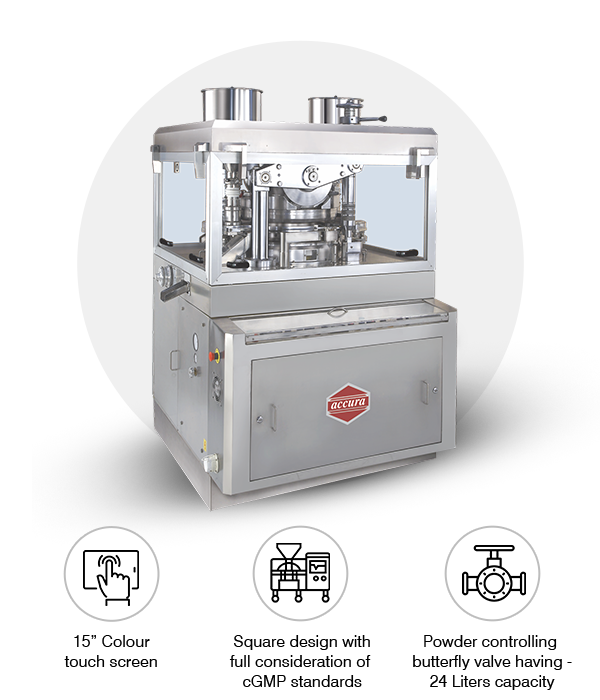The advent of tablet manufacturing machines has drastically transformed the pharmaceutical industry. With the ability to mass-produce drugs with speed, precision and consistency, these machines have played a crucial role in meeting the growing global demand for pharmaceutical tablets. The tablet press machine is the backbone of modern tablet production, enabling manufacturers to produce large quantities of high-quality tablets quickly and efficiently. This article explores the evolution of tablet press machines, their impact on drug manufacturing and the innovations that have reshaped the industry.
The Evolution of Tablet Manufacturing Machines
Before the widespread use of tablet manufacturing machines, the production of tablets was a labor-intensive process. Early tablet production methods were slow, inefficient and prone to inconsistencies. The introduction of tablet press machines marked the beginning of a new era in pharmaceutical manufacturing.
The Rise of Automated Tablet Press Machines
The tablet press machine came into play in the mid-20th century, introducing a new level of automation and precision to the tablet manufacturing process. These machines could press powders into tablets with remarkable speed and consistency. With the introduction of the rotary tablet press, production speeds increased exponentially and manufacturers were able to produce large quantities of tablets in a fraction of the time.
Over time, tablet manufacturing machines became more sophisticated, incorporating advanced features such as programmable controls, automatic weight adjustment and enhanced safety mechanisms. These innovations enabled manufacturers to produce tablets with greater accuracy and fewer defects, resulting in better-quality products and improved patient safety.

The Impact of Tablet Press Machines in Drug Production
The evolution of tablet press machines has had a profound impact on drug production. From improving efficiency and consistency to lowering costs and ensuring regulatory compliance, these machines have transformed the way pharmaceuticals are manufactured.
Increased Efficiency and Speed
One of the primary benefits of tablet press machines is their ability to produce large quantities of tablets in a short amount of time. Modern tablet press machines can produce thousands of tablets per minute, drastically increasing production efficiency. This speed has been crucial in meeting the growing demand for pharmaceutical products, particularly in regions with large populations or in times of global health crises.
Consistency and Precision
Tablet manufacturing machines offer unprecedented precision in tablet production. With automated controls, tablet press machines can ensure that each tablet is of the correct size, weight and hardness. This consistency is vital for maintaining product quality and ensuring that patients receive the correct dosage of medication. Inconsistent tablet quality could lead to under or overdosing, which can have serious consequences for patient health.
Tablet Coating Machines: Enhancing Tablet Functionality
While tablet press machines are responsible for shaping the tablets, tablet coating machines play an equally important role in modern drug production. Coating tablets with protective layers enhances their functionality, stability and patient experience.
The Role of Tablet Coating in Drug Production
Tablet coatings are applied for various reasons, such as:
- Protecting the tablet from environmental factors like moisture, light and air, which could degrade the active pharmaceutical ingredients (APIs).
- Masking unpleasant odors and tastes, making the tablets more palatable for patients.
- Controlling the release of the drug, such as in the case of extended-release or enteric-coated tablets.
- Improving the tablet's appearance, making it more appealing to consumers.
Tablet coating machines have evolved significantly, with advancements in coating technologies allowing for greater control over the thickness and uniformity of coatings. This ensures that tablets not only meet regulatory standards but also offer enhanced functionality and better patient adherence.
Innovations in Tablet Manufacturing Machines in Drug Production
As pharmaceutical needs have evolved, so too have tablet manufacturing machines. New innovations in tablet press technology and coating machines have further revolutionized the drug production process.
Modern Tablet Press Machines: Features and Advancements
- High-Speed Production: Today's tablet press machinescan produce thousands of tablets per minute, significantly increasing production capacity.
- Enhanced Control Systems: Modern machines come with advanced control systems that allow manufacturers to monitor and adjust parameters like tablet weight, hardness and shape in real-time.
- Greater Flexibility: Tablet press machines now offer greater flexibility in terms of tablet size, shape and formulation, allowing for the production of a wide range of tablets to meet varying patient needs.
- Continuous Manufacturing: With innovations in automation, manufacturers can now implement continuous manufacturing processes, reducing production time and enhancing efficiency.
The Role of Tablet Manufacturing Machines in Regulatory Compliance
One of the key challenges in the pharmaceutical industry is ensuring that drugs meet strict regulatory standards. The consistency, quality and safety of tablets are crucial in gaining regulatory approval from agencies such as the FDA and EMA. Tablet press machines and other allied equipment play a significant role in ensuring compliance with these standards.
In addition, tablet machines must meet cGMP standards for coating uniformity, batch-to-batch consistency and product stability. Manufacturers must also adhere to strict hygiene and safety protocols to prevent contamination and ensure product safety.
